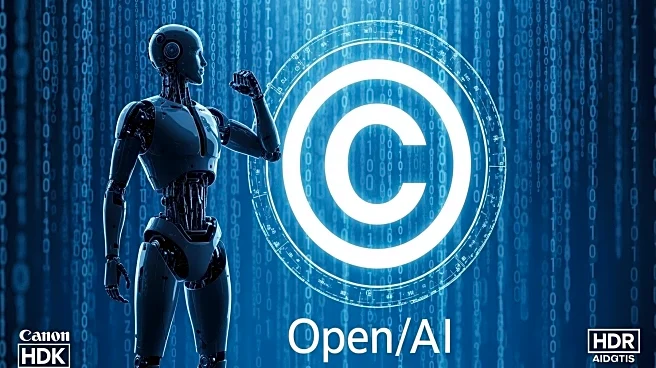What's Happening?
Hollywood is facing a significant challenge as OpenAI introduces its updated Sora AI video tool, which allows users to upload videos of real people and integrate them into AI-generated environments. This development has sparked a backlash from major Hollywood studios and talent agencies, who are concerned about the control and compensation for the use of actors' likenesses and licensed characters in AI models. The Motion Picture Association and unions like SAG-AFTRA have expressed alarm, emphasizing the importance of established copyright laws. OpenAI, led by CEO Sam Altman, is engaging with studios and rightsholders to address these concerns, but the dispute highlights a cultural clash between Silicon Valley's rapid innovation and Hollywood's cautious approach to new technology.
Why It's Important?
The conflict between Hollywood and OpenAI over AI-generated content has significant implications for the entertainment industry. As AI technology advances, the ability to replicate actors and characters raises questions about intellectual property rights and fair compensation. This dispute could set precedents for how AI is used in creative industries, impacting actors, studios, and tech companies. The outcome may influence future licensing agreements and the balance between innovation and copyright protection. Stakeholders in the entertainment sector stand to gain or lose based on how these issues are resolved, potentially affecting the industry's economic foundation and creative control.
What's Next?
The legal battle between Hollywood studios and OpenAI is expected to intensify, with potential court cases shaping the future of AI use in entertainment. Studios and talent agencies may push for licensing agreements to ensure fair compensation for the use of their intellectual property. OpenAI has indicated plans to provide more control to rights holders and explore compensation models for video generation. The resolution of this dispute will likely influence how AI technology is integrated into the entertainment industry, with broader implications for copyright law and creative rights.
Beyond the Headlines
The clash between Hollywood and OpenAI underscores deeper ethical and cultural dimensions. It raises questions about the balance between technological innovation and the protection of creative rights. The entertainment industry must navigate the challenges posed by AI while preserving the integrity of intellectual property. This situation highlights the need for clear guidelines and regulations to address the evolving landscape of AI-generated content, ensuring that creators and rights holders are fairly compensated and their work is protected.









